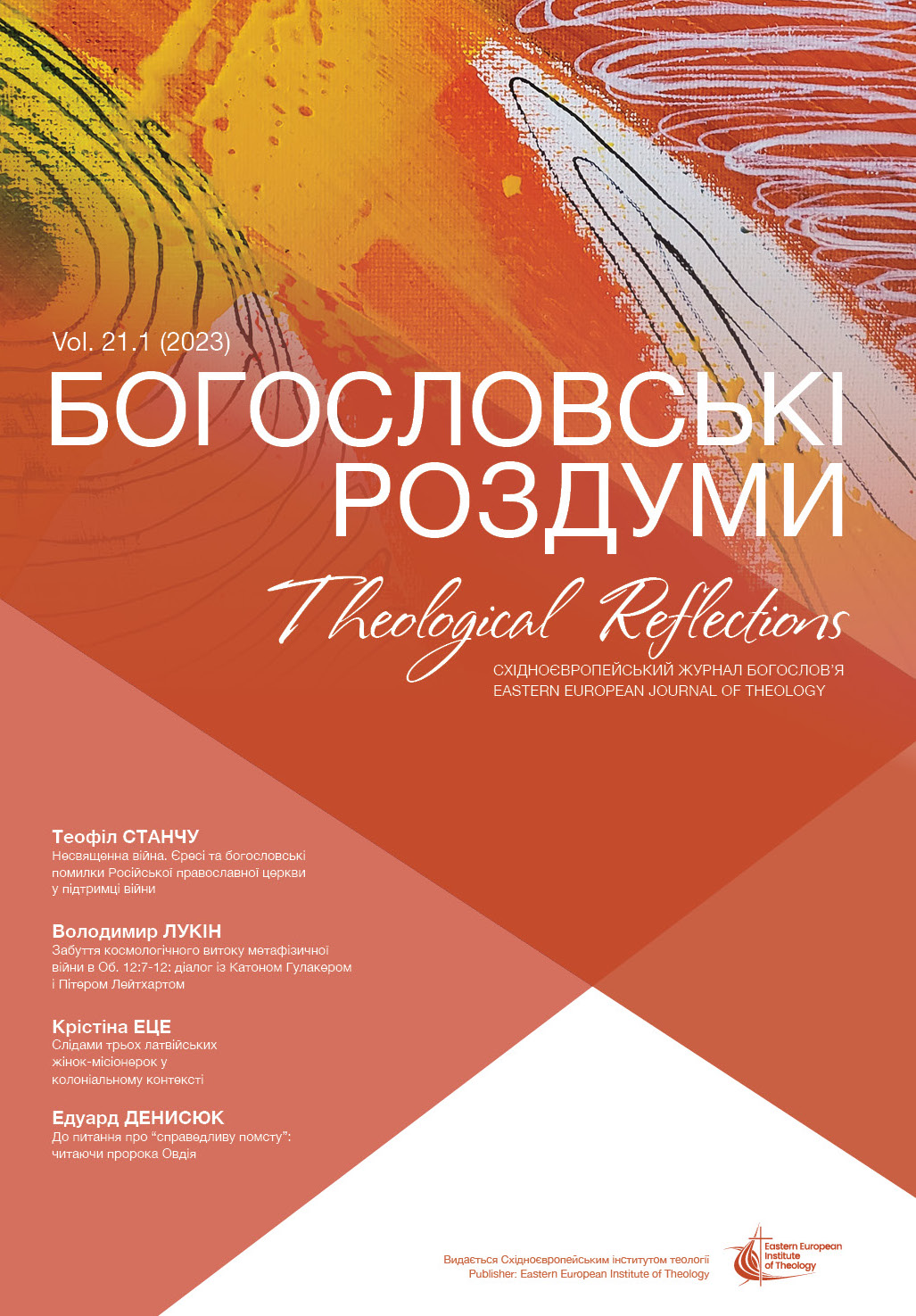The Unholy War Heresies and Theological Errors in the Russian Orthodox Church’s Support for War
DOI:
https://doi.org/10.29357/2789-1577.2023.21.1.1Keywords:
ethno-phyletism, human rights, political religion, ethnic and civilizational nationalismAbstract
It is difficult not to see how the Russian Orthodox Church (ROC) has taken the wrong side when it openly supported the war against Ukraine. But in so doing, ROC invited in some problematic and even heretical teachings. It embraced the heresy of (ethno-)phyletism, it combined ethnic nationalism with civilizational nationalism into a toxic mix, and it also violated its own social teaching that explicitly states that waging aggressive external war is one of the areas “in which the clergy and canonical church structures cannot support the state or cooperate with it.” Moreover, it has promoted and supported a political ideology that downplays the human dignity inherent to every living person. This paper will shortly explore each one of these theological transgressions and will conclude with some warnings that such ideas have a contagious potential that could easily spread to other countries in the region, with emphasis on Romania’s case.
References
- Biliuță, Ionuț. “Constructing Fascist Hagiographies: The Genealogy of the Prison Saints Movement in Contemporary Romania.” Contemporary European History (2021): 1-21. doi:10.1017/S0960777321000424.
- Biliuță, Ionuț. “The Romanian Orthodox Church between the Alliance for the Union of Romanians and the Putinist Temptation: Ultranationalist Propaganda among Orthodox Clergymen and the Russian War Against Ukraine.” Studia Universitatis Babeș-Bolyai Theologia Catholica Latina 2023 pp. 120–134. https://doi.org/10.24193/theol.cath.latina.2023.LXVIII.1.06.
- Brüning, Alfons and Evert van der Zweerde. “Introduction: Orthodox Christianity and Human Rights – An Ambiguous Relationship.” In Alfons Brüning and Evert van der Zweerde. Orthodox Christianity and Human Rights, 1-19. Leuven: Peeters, 2012.
- Herescu, Dragoș. “Ortodoxie, societate și secularizare în România – O perspectivă critică.” In Răzvan Brudiu, Mihail K. Qaramah, eds., Biserica și Statul: perspective diacronice asupra unei relații polivalente, 133-151. Iași: Doxologia, 2023.
- Hovorun, Cyril. “Is the Byzantine “Symphony” Possible in Our Days?” Journal of Church and State Volume 59, Issue 2 (2017): 282-288. doi:10.1093/jcs/csv140.
- Hovorun, Cyril. Meta-Ecclesiology: Chronicles on Church Awareness. New York: Palgrave Macmillan, 2015.
- Hovorun, Cyril. Political Orthodoxies: The Unorthodoxies of the Church Coerced. Minneapolis: Fortress Press, 2018.
- Ioanid, Radu. “The sacralized politics of the Romanian Iron Guard.” Totalitarian Movements and Political Religions 5:3 (2016): 419-453. DOI: 10.1080/1469076042000312203.
- Kalaitzidis, Pantelis. Ortodoxie și modernitate. O introducere. Trans. Florin-Cătălin Ghiț. Cluj- Napoca, Eikon, 2010.
- Leuștean, Lucian. “‘For the Glory of Romanians’: Orthodoxy and Nationalism in Greater Romania, 1918–1945.” Nationalities Papers Vol. 35, No. 4 (2007): 717-742.
- Negruț, Paul. Biserica și Statul. O interogație asupra modelului “simfoniei” bizantine. Oradea: EIBE, 2000.
- Papanikolaou, Aristotle. The Mystical as Political: Democracy and Non-Radical Orthodoxy. Notre Dame, IN: University of Notre Dame Press, 2012.
- Preda, Radu. Ortodoxia și ortodoxiile. Studii social-teologice. Cluj-Napoca, Eikon, 2010.
- Searle, Joshua. “A Theological Case for Ukraine’s European Integration: Deconstructing the Myth of “Holy Russia” Vs. ‘Decadent Europe’”. Theological Reflections: Eastern European Journal of Theology 20.2 (2022): 15-30. doi.org/10.29357/2789-1577. 2022.20.2.1.
- Shyshkov, Andrii. “‘Russkii mir,’ Orthodoxy and War.” Theological Reflections: Eastern European Journal of Theology 20.2 (2022): 63-78. doi.org/10.29357/2789-1577.2022.20.2.5.
- Udrea, Matei. “Rusofobia la români. De ce nu-i suportă poporul român pe ruși: jaloanele unei ostilități seculare.” Colecționarul de istorie. Published 26 martie 2021: https://colectionaruldeistorie.ro/rusofobia-la-romani-de-ce-nu-i-suporta-poporul-roman-pe-rusi-jaloanele-unei-ostilitati-seculare/. Accessed May 30, 2023.
- Velicu, Adrian. The Orthodox Church and National Identity in Post-Communist Romania. Cham, Palgrave Macmillan, 2020.
- Bases of the Social Concept of the Russian Orthodox Church. URL: http://orthodoxeurope.org/page/3/14.aspx. Accessed May 15, 2023.
- For the Life of the World. Toward a Social Ethos of the Orthodox Church. URL: https://www. goarch.org/social-ethos. Accessed June 2, 2023.
- Russian Orthodox Church’s Basic Teaching on Human Dignity, Freedom, and Rights. URL: https://old.mospat.ru/en/documents/dignity-freedom-rights/. Accessed June 1, 2023.
- https://ziare.com/ungaria/ungaria-sondaj-popularitate-premier-viktor-orban-romania-1752595.
- https://talkabout.iclrs.org/2021/05/03/forb_in_russia/. Accessed on June 3, 2023.
- https://www.eauk.org/current-affairs/news/has-russia-banned-evangelism.cfm. Accessed on June 3, 2023.
- https://www.pravda.com.ua/eng/news/2023/01/7/7383898/. Accessed June 15, 2023. https://mospat.ru/en/news/46324/. Accessed June 15, 2023.
Downloads
Published
How to Cite
Issue
Section
License
Copyright (c) 2023 Teofil Stanciu

This work is licensed under a Creative Commons Attribution-NonCommercial 4.0 International License.
All articles published in the Journal are distributed under a Creative Commons Attribution-NonCommercial 4.0 International License
By submitting an article for publication in Theological Reflections: Eastern European Journal of Theology the author grants the editors the right to publish the article and distribute it in electronic and print form.
The author reserves all copyrights and the right to use the materials of the article in whole or in part for educational purposes, to write his own dissertations, to prepare abstracts, conference reports, oral presentations, etc., as well as post electronic copies of articles (including the final electronic version downloaded from the journal’s official website) on non-commercial web-resources without the consent of the editorial board and founders.



